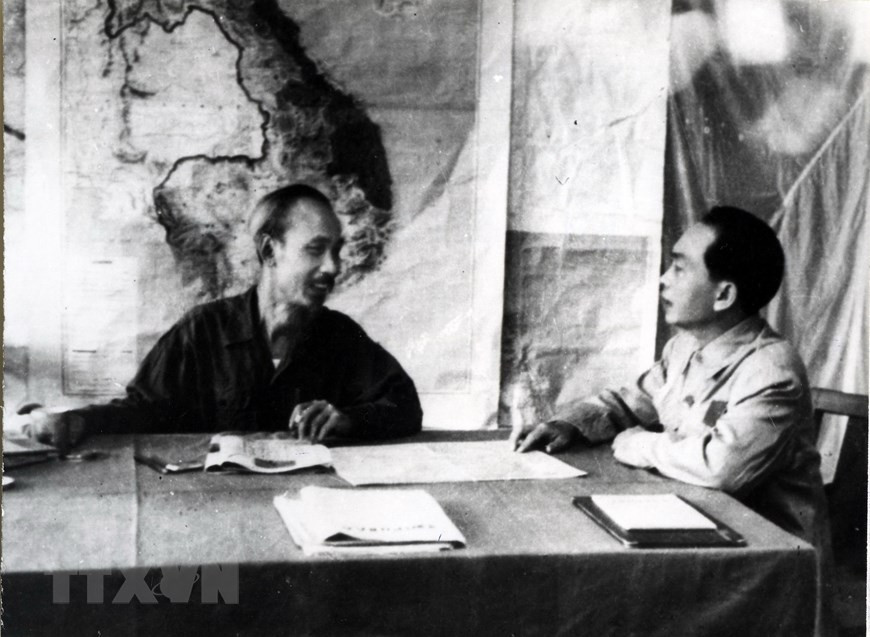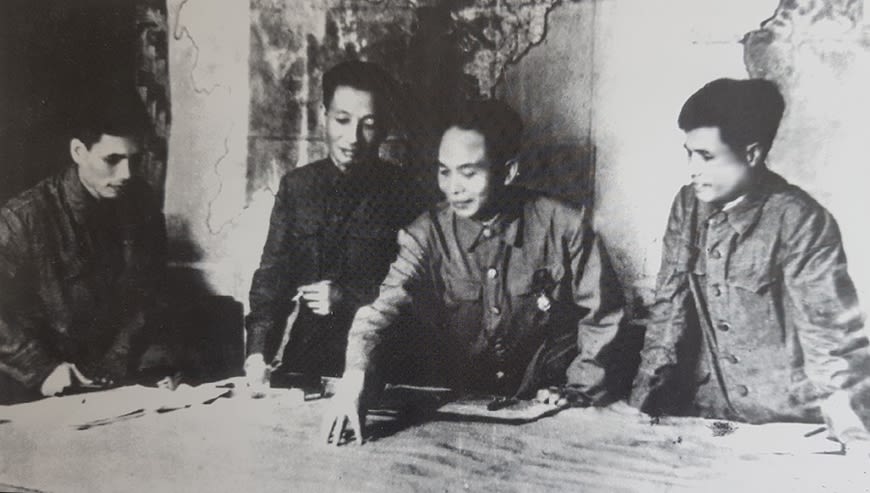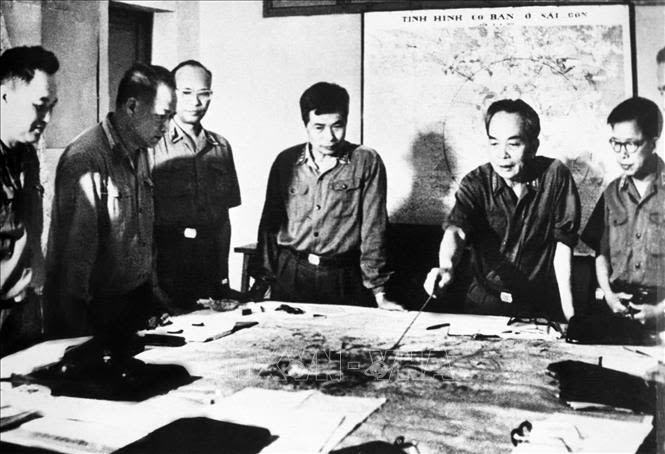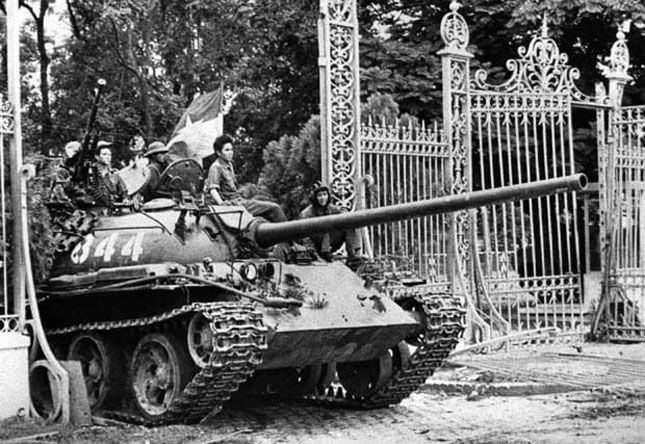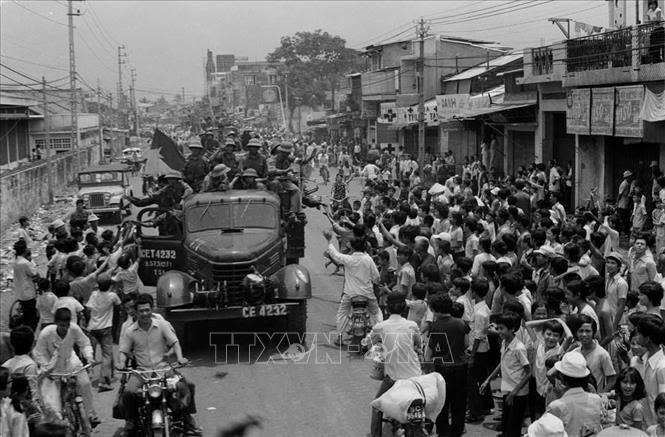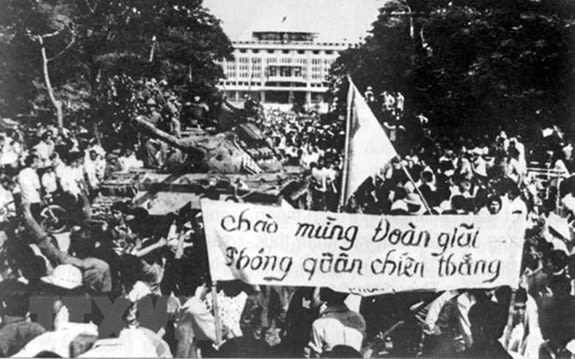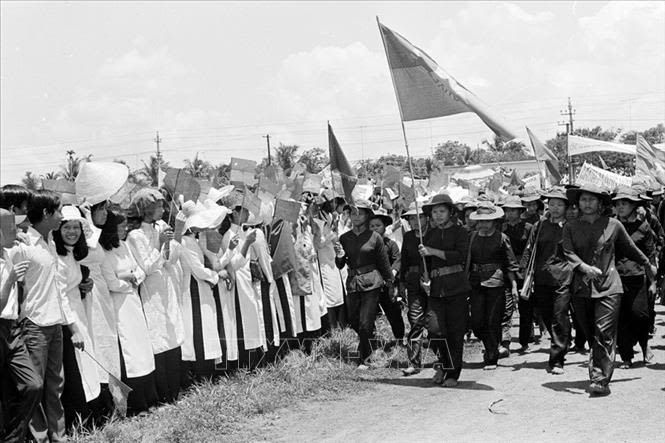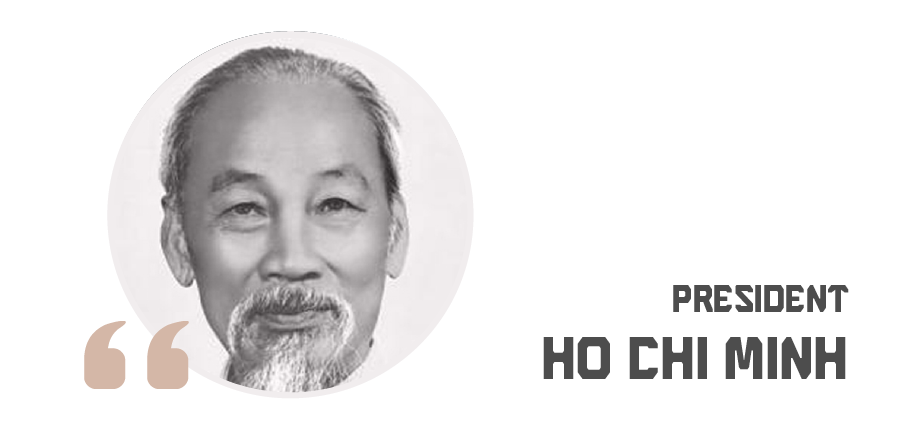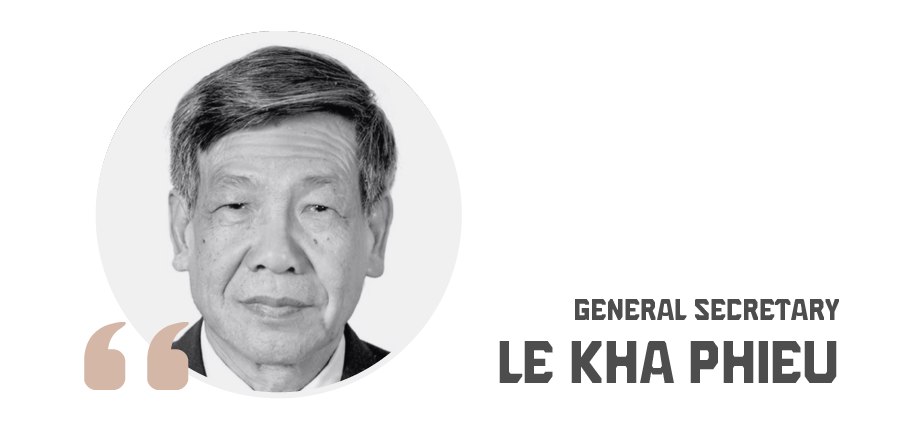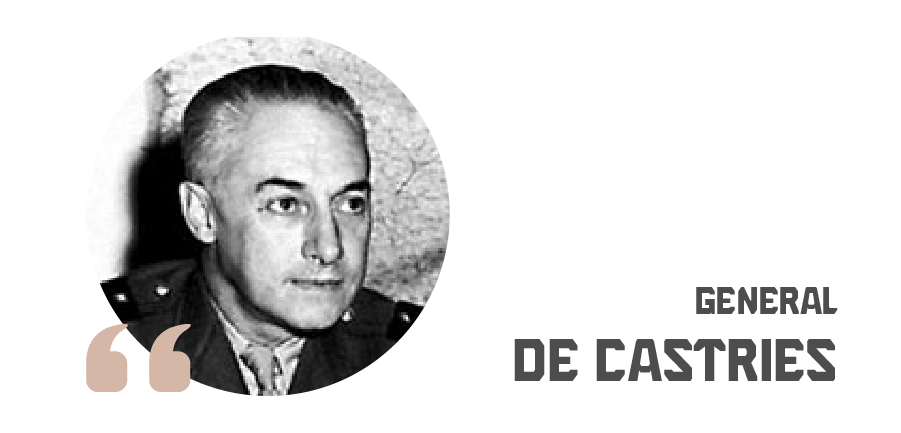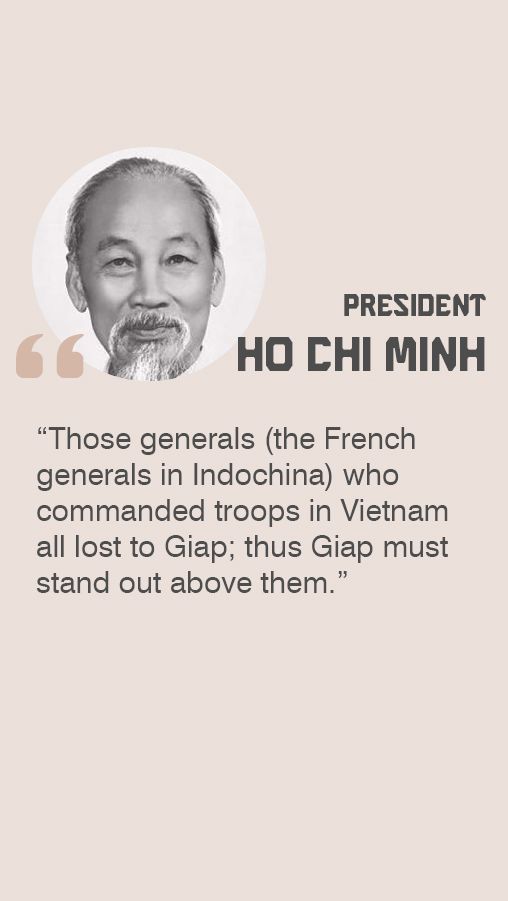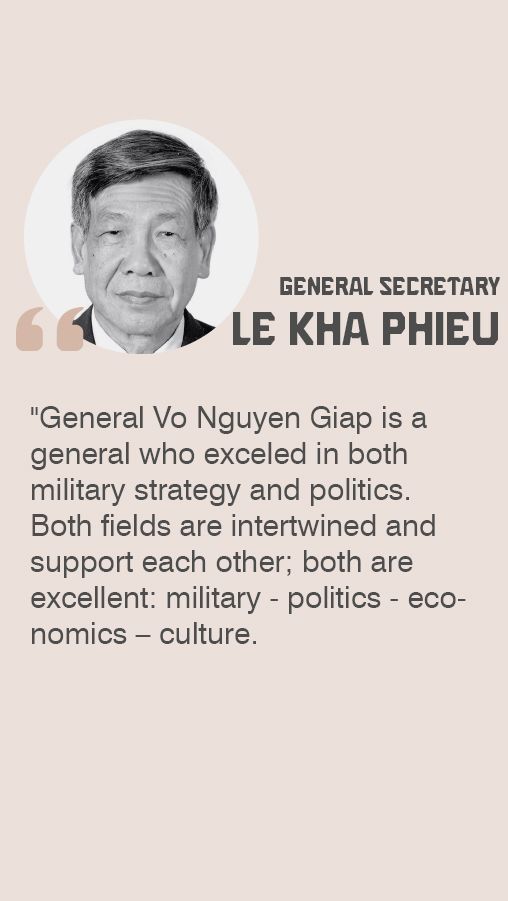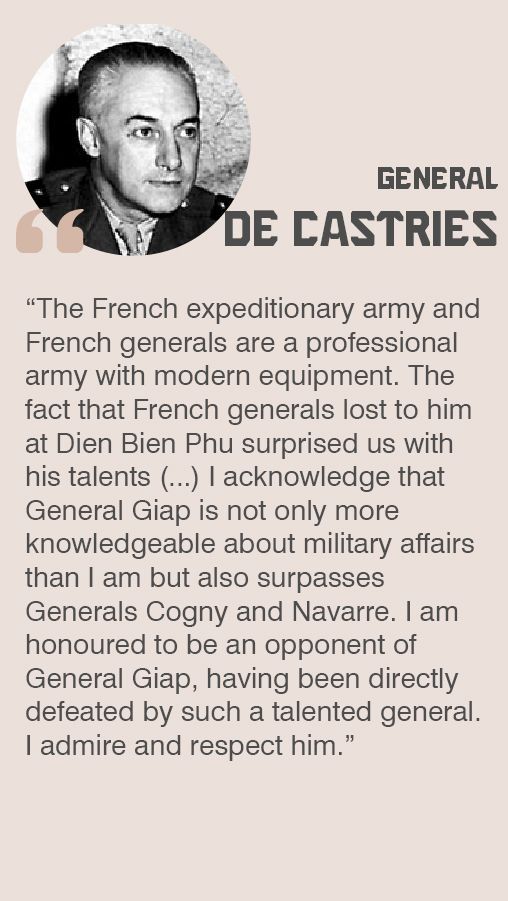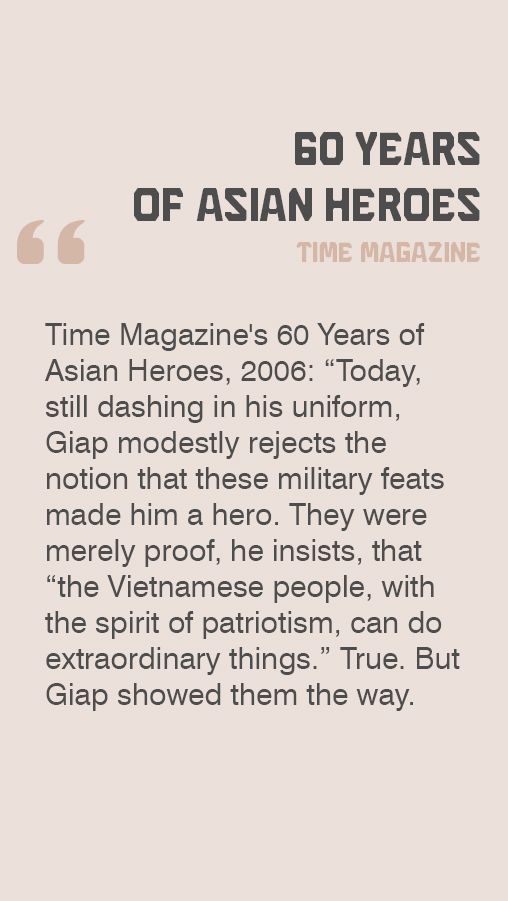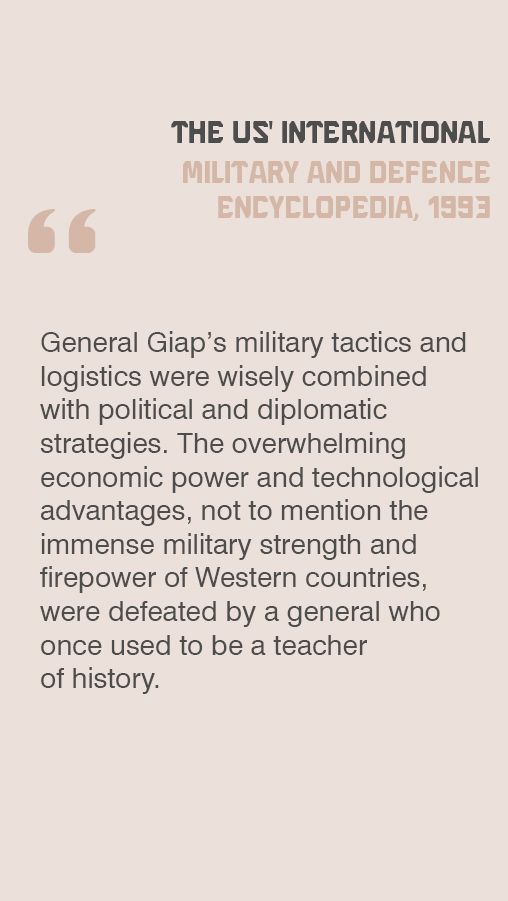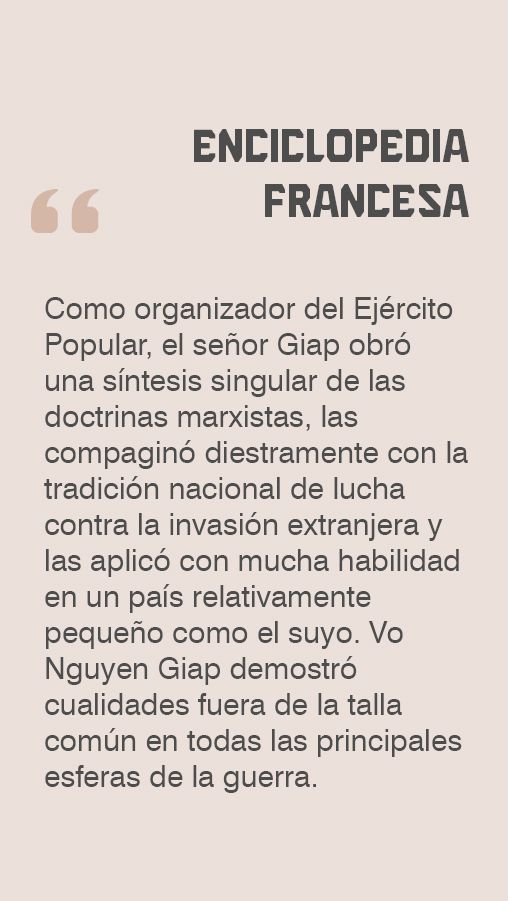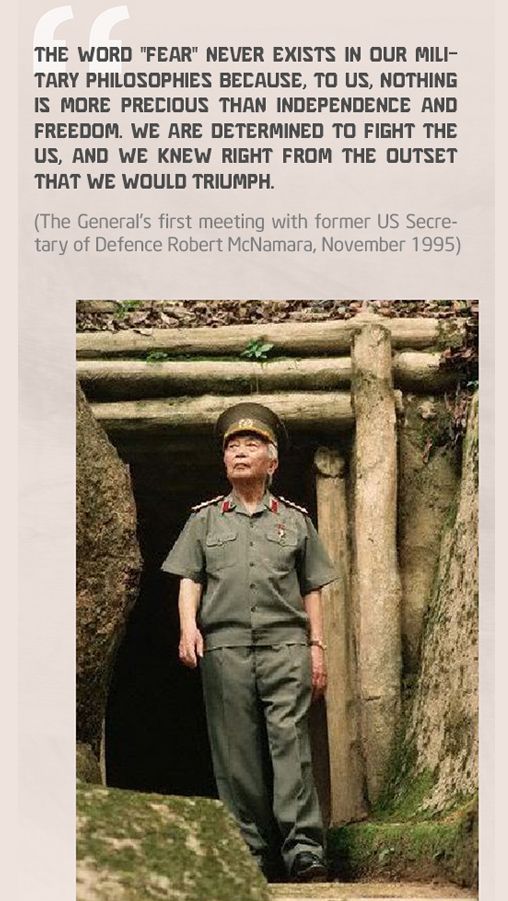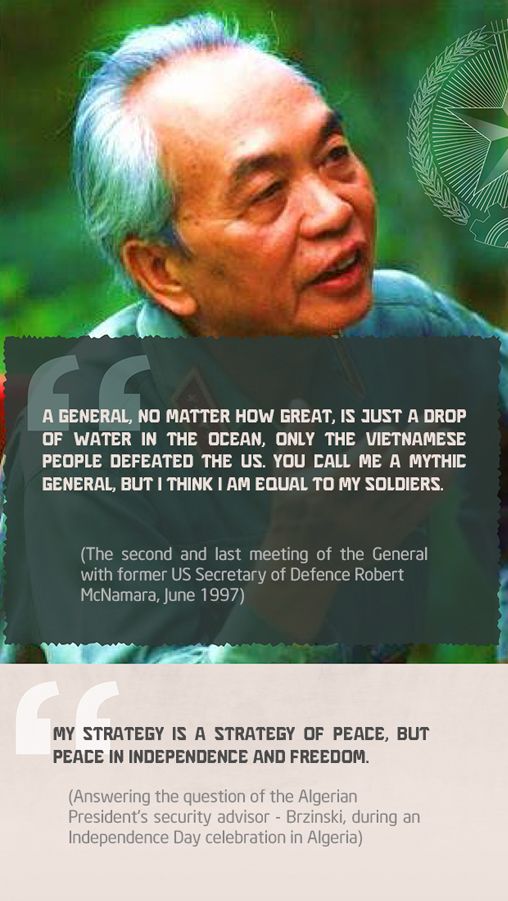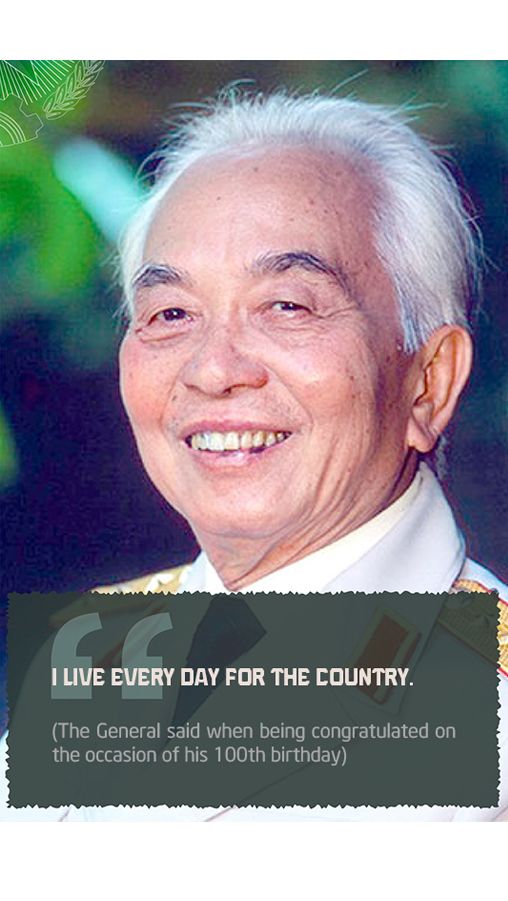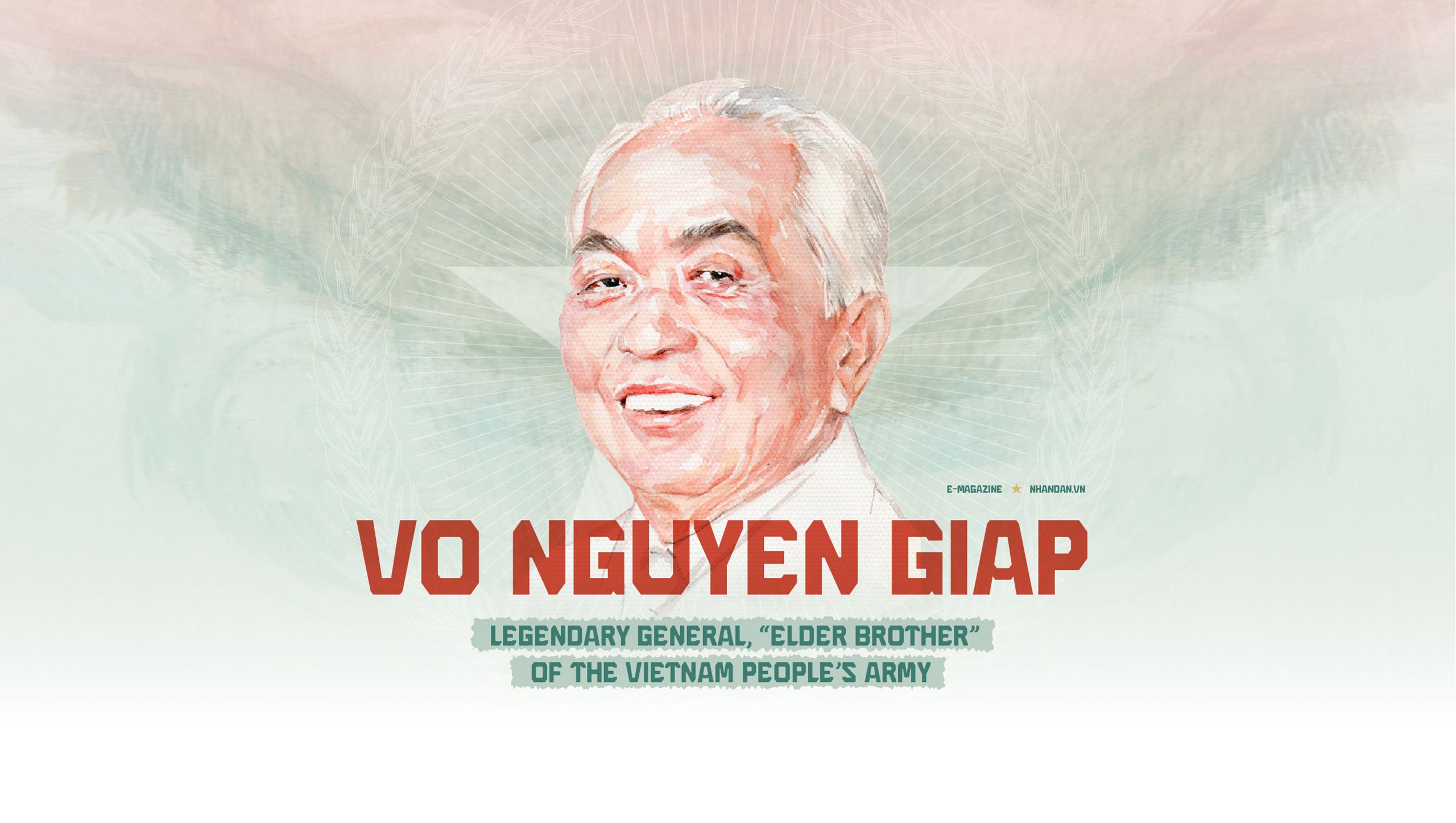
General and Commander-in-Chief Vo Nguyen Giap — an excellent and close student of President Ho Chi Minh, the “Elder Brother” of the heroic Vietnamese People’s Army — was loved and respected by the people, admired by international friends, and held as the pride of generations of officers and soldiers of the entire army. The legendary general of Vietnam and the world, although he did not attend any military school, under the comprehensive, absolute, correct and creative leadership of the Communist Party of Vietnam and leader Ho Chi Minh, Vo Nguyen Giap, together with the General Command of the Vietnam People’s Army, the Central Military Commission, and the Ministry of Defence, led and commanded the building of the army from “zero” to quickly develop its forces with growing organisational and operational levels, enhance its combat power, and defeat many famous generals of powerful colonial and imperialist armies in the world, changing the course of national and human history.
His name and career will forever be engraved in the history of the nation, a famous general in world history, contributing to enriching Vietnamese military art, contributing to the formation and development of military doctrine — the unique people’s war strategy of Vietnam in the Ho Chi Minh era. He was also the first and only Commander-in-Chief of the Vietnam People’s Army, the first general, and the general who defeated the most foreign generals.
General Vo Nguyen Giap was born to a family of Confucian scholars with great patriotism in Loc Thuy Commune, Le Thuy District, Quang Binh Province, on August 25, 1911. He embarked on the revolutionary path at a very young age under the guidance of his seniors and teachers at the Hue National School, participating in patriotic and revolutionary organisations: the Vietnamese Revolutionary Youth League, Tan Viet Revolutionary Party, Indochinese Communist League, becoming an alternative member of the Central Committee, in charge of propaganda and communications of the Tan Viet Revolutionary Party General Department. Vo Nguyen Giap contributed greatly to promoting Tan Viet to become the Indochinese Communist League — one of the three predecessor organisations of the Communist Party of Vietnam. He was sentenced to 2 years in prison by the French colonialists for participating in supporting the Nghe - Tinh Soviet movement.

April 1940 marked a turning point in Vo Nguyen Giap’s revolutionary career. He and Pham Van Dong were directly assigned by Hoang Van Thu, Secretary of the Northern Regional Party Committee, to go to Southern China to meet with leader Nguyen Ai Quoc.
In early June 1940, in Kunming, Yunnan (China), the two men met comrade Vuong (i.e. leader Nguyen Ai Quoc). From here, Vo Nguyen Giap became close to and became an excellent student of Nguyen Ai Quoc (Ho Chi Minh).
Realising that Vo Nguyen Giap had an innate military talent, after a period of testing and training, in December 1944, leader Nguyen Ai Quoc assigned Vo Nguyen Giap to establish the Vietnam Propaganda Unit of Liberation Army — the forerunner of the Vietnam People’s Army.
From then on, Vo Nguyen Giap held the role of the highest commander of the Vietnam People’s Army. Under the leadership of the Party, headed by President Ho Chi Minh, and under the direct guidance of Vo Nguyen Giap, the army of 34 soldiers became an increasingly powerful revolutionary army, gradually defeating the professional, formidable armies, equipped with the most modern and sophisticated weapons of war at that time, winning and maintaining independence and freedom for the nation, territorial integrity for the Fatherland, and leading the whole country to socialism.
During the resistance war against the French colonialists, in his capacity as Secretary of the Central Military Commission, General Political Commissar, Secretary of the General Military Commission, Minister of Defence, and Commander-in-Chief of the Army, General Vo Nguyen Giap thoroughly grasped the line of resistance against the French colonialists, implemented the direction of President Ho Chi Minh, built the Vietnam People’s Army to gradually grow stronger, promoted the role of the revolutionary army, acted as the core for the entire people to fight the enemy, and promoted the widespread people’s war posture, gradually defeated the enemy’s military plans.
General Giap directly commanded many important campaigns that marked the development of the resistance war, such as the Border Campaign, Hoa Binh, Northwest, Upper Laos, and others. Notably, during the Dien Bien Phu Campaign, with his sharp military thinking and profound strategic vision, General Commander-in-Chief Vo Nguyen Giap changed the combat approach from “quick attack, quick victory” to “steady attack, steady advance”, leading to the Dien Bien Phu Victory that “resounded across five continents and shook the earth”. This victory ended the resistance war against French colonialism and elevated General Giap to the ranks of the world’s great military commanders.
In the resistance war against the US, as Deputy Prime Minister, Secretary of the Central Military Commission, Minister of Defence, and Commander-in-Chief of the Army, General Giap directed the military and people in both the North and South to successively defeat America’s military strategies and highest military efforts, achieving resounding victories such as the strategic counter-offensives in the dry seasons of 1965-1966 and 1966-1967, the Route 9 - Southern Laos Campaign in 1971, the strategic offensive in 1972, and the two American destructive warfare campaigns, creating the “Dien Bien Phu in the Air” over Hanoi’s skies in December 1972. Specifically, the great Spring 1975 Victory, which culminated in the Ho Chi Minh Campaign, established a brilliant milestone, ending 30 years of revolutionary war, regaining complete independence for the nation, and reunifying the country.
After the country was reunified, General Giap, together with the collective leadership of the Party, State, and Army, led the entire people and military in implementing two strategic tasks: building and defending the socialist Vietnamese motherland, and carrying out the country’s renovation. In 1991, General Vo Nguyen Giap retired at the age of 80.
With his great contributions to the revolutionary cause of the Party and nation, and his significant reputation both domestically and internationally, General Vo Nguyen Giap was awarded the Gold Star Order, Ho Chi Minh Order, the 70-year Party membership badge, and many other prestigious medals and honours from Vietnam and internationally.
The generations of officers and soldiers of the Vietnam People’s Army revered him as the “Eldest Brother” of the army. The soldiers under his leadership and command were lovingly called “Uncle Ho’s Army” by the people — a source of pride and honour that not every army in the world could achieve.
General Vo Nguyen Giap in 1940
General Vo Nguyen Giap in 1940
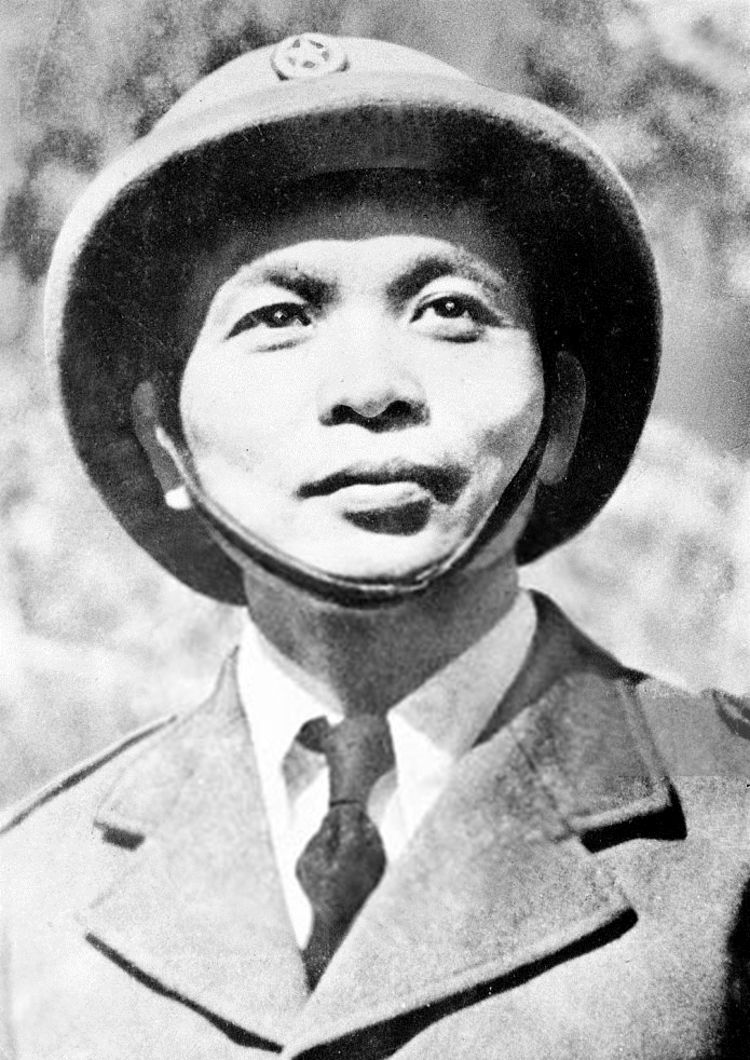
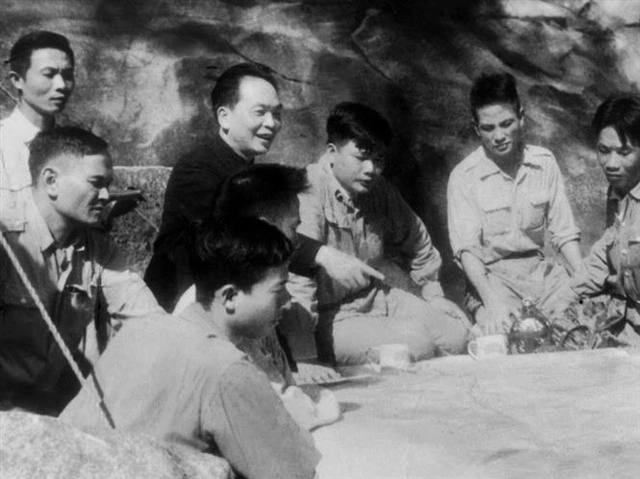
April 1940 marked a turning point in Vo Nguyen Giap’s revolutionary career. He and Pham Van Dong were directly assigned by Hoang Van Thu, Secretary of the Northern Regional Party Committee, to go to Southern China to meet with leader Nguyen Ai Quoc.
In early June 1940, in Kunming, Yunnan (China), the two men met comrade Vuong (i.e. leader Nguyen Ai Quoc). From here, Vo Nguyen Giap became close to and became an excellent student of Nguyen Ai Quoc (Ho Chi Minh).
Realising that Vo Nguyen Giap had an innate military talent, after a period of testing and training, in December 1944, leader Nguyen Ai Quoc assigned Vo Nguyen Giap to establish the Vietnam Propaganda Unit of Liberation Army — the forerunner of the Vietnam People’s Army.
From then on, Vo Nguyen Giap held the role of the highest commander of the Vietnam People’s Army. Under the leadership of the Party, headed by President Ho Chi Minh, and under the direct guidance of Vo Nguyen Giap, the army of 34 soldiers became an increasingly powerful revolutionary army, gradually defeating the professional, formidable armies, equipped with the most modern and sophisticated weapons of war at that time, winning and maintaining independence and freedom for the nation, territorial integrity for the Fatherland, and leading the whole country to socialism.
During the resistance war against the French colonialists, in his capacity as Secretary of the Central Military Commission, General Political Commissar, Secretary of the General Military Commission, Minister of Defence, and Commander-in-Chief of the Army, General Vo Nguyen Giap thoroughly grasped the line of resistance against the French colonialists, implemented the direction of President Ho Chi Minh, built the Vietnam People’s Army to gradually grow stronger, promoted the role of the revolutionary army, acted as the core for the entire people to fight the enemy, and promoted the widespread people’s war posture, gradually defeated the enemy’s military plans.
General Giap directly commanded many important campaigns that marked the development of the resistance war, such as the Border Campaign, Hoa Binh, Northwest, Upper Laos, and others. Notably, during the Dien Bien Phu Campaign, with his sharp military thinking and profound strategic vision, General Commander-in-Chief Vo Nguyen Giap changed the combat approach from “quick attack, quick victory” to “steady attack, steady advance”, leading to the Dien Bien Phu Victory that “resounded across five continents and shook the earth”. This victory ended the resistance war against French colonialism and elevated General Giap to the ranks of the world’s great military commanders.
In the resistance war against the US, as Deputy Prime Minister, Secretary of the Central Military Commission, Minister of Defence, and Commander-in-Chief of the Army, General Giap directed the military and people in both the North and South to successively defeat America’s military strategies and highest military efforts, achieving resounding victories such as the strategic counter-offensives in the dry seasons of 1965-1966 and 1966-1967, the Route 9 - Southern Laos Campaign in 1971, the strategic offensive in 1972, and the two American destructive warfare campaigns, creating the “Dien Bien Phu in the Air” over Hanoi’s skies in December 1972. Specifically, the great Spring 1975 Victory, which culminated in the Ho Chi Minh Campaign, established a brilliant milestone, ending 30 years of revolutionary war, regaining complete independence for the nation, and reunifying the country.
After the country was reunified, General Giap, together with the collective leadership of the Party, State, and Army, led the entire people and military in implementing two strategic tasks: building and defending the socialist Vietnamese motherland, and carrying out the country’s renovation. In 1991, General Vo Nguyen Giap retired at the age of 80.
With his great contributions to the revolutionary cause of the Party and nation, and his significant reputation both domestically and internationally, General Vo Nguyen Giap was awarded the Gold Star Order, Ho Chi Minh Order, the 70-year Party membership badge, and many other prestigious medals and honours from Vietnam and internationally.
The generations of officers and soldiers of the Vietnam People’s Army revered him as the “Eldest Brother” of the army. The soldiers under his leadership and command were lovingly called “Uncle Ho’s Army” by the people — a source of pride and honour that not every army in the world could achieve.
1. CHANGING THE ATTACK TARGET FROM CAO BANG TO SONG KHE IN THE 1950 BORDER CAMPAIGN
During the 1950 Border Campaign, in his position as Party Secretary of the Border Front, Commander-in-Chief, and Political Commissar of the Campaign, General Vo Nguyen Giap made important contributions that helped Vietnam achieve victory in the campaign, creating a fundamental turning point in the Vietnamese people’s resistance war against French colonialists.
According to the initial combat plan, Vietnamese forces would begin the campaign by concentrating superior military force to attack and destroy the enemy in Cao Bang Town. After taking Cao Bang, they would move down to eliminate the enemy in Dong Khe, then determine the next direction of the campaign based on the situation.
However, before departing for the campaign, General Vo Nguyen Giap met with President Ho Chi Minh to report on the situation and received his instruction: “This campaign is very important — victory is the only option, defeat is not acceptable.” This instruction caused the Commander-in-Chief to think deeply about the campaign’s importance. Were the campaign’s objectives beyond the soldiers’ capabilities? Was choosing Cao Bang Town as the target to start the campaign correct? Could we mobilise enough food supplies for the large force of soldiers and civilian workers during this extended campaign?
Uncle Ho discussing combat plans with General Vo Nguyen Giap for the 1950 Border Campaign
Uncle Ho discussing combat plans with General Vo Nguyen Giap for the 1950 Border Campaign
From these concerns, in early August 1950, the Campaign Command organised a field reconnaissance in Cao Bang. After analysing and evaluating the situation, the decision was made to ensure a decisive victory in the first battle, a key opening battle for the first large-scale offensive operation of our army. At the meeting of the Border Front Party Committee on August 16, 1950, General Vo Nguyen Giap, Secretary of the Border Front Party Committee and Commander of the Campaign, concluded that attacking Cao Bang first, “we cannot be certain of a guaranteed victory”. Therefore, he proposed a new combat plan, which was to attack Dong Khe first to open the campaign.
The reasoning was:
If we attacked Cao Bang first, we would face some difficulties, such as the issue of crossing the river, dealing with enemy paratroopers reinforcing during the battle, etc. If we failed to capture Cao Bang, it would undermine the morale of our troops. On the other hand, attacking Dong Khe aligned with the principle of ensuring a sure victory in the first battle of the campaign, suited our method of combat (targeting key points, cutting off reinforcements, primarily aiming at eliminating the enemy outside their fortifications), and was more convenient for deploying troops and firepower, as well as better matching the fighting capabilities of our soldiers. It provided a higher chance of ensuring victory and an opportunity to strike enemy reinforcements.
Furthermore, the enemy forces at Dong Khe were weaker compared to other targets - it was relatively vulnerable but strategically important. If Dong Khe was breached, the entire enemy defence system would be divided and threatened. Given its strategic location as a vital link between Cao Bang Town and That Khe, if Dong Khe was lost, the defence line along Route 4 would be severed, isolating Cao Bang Town, forcing the enemy to either send troops to rescue Dong Khe or withdraw forces from Cao Bang for support.
This plan was promptly reported to President Ho Chi Minh and was approved.
The development of the campaign unfolded exactly as General Vo Nguyen Giap had predicted. After preparation, on September 16, 1950, our forces launched the attack on Dong Khe. By the morning of September 18, the enemy retreated, and we controlled the battlefield. The enemy was forced to send reinforcements, and the Lepager Corps was ordered to advance along Route 4 to meet the Charton Corps retreating from Cao Bang and join forces at Dong Khe. We skillfully “lured” the two most battle-hardened French corps away from their fortified positions, isolating them so they could not merge and ultimately trapping them in a “net” we had set up at Coc Xa – Stronghold 477, where we annihilated them. This victory demonstrated the strategic genius of General Vo Nguyen Giap.
2. CHANGING THE COMBAT PRINCIPLE FROM “STRIKE FAST, SOLVE FAST” TO “STRIKE STEADILY, ADVANCE STEADILY” IN THE DIEN BIEN PHU BATTLE 1954
After Dien Bien Phu was chosen as the decisive strategic point for a final battle between Vietnam and the French colonists, on January 14, 1954, at the Campaign Headquarters in Tham Pua, the Party Committee and Campaign Command convened a meeting to discuss the battle plan under the “strike fast, solve fast” principle, assigning tasks for preparations according to the meeting’s resolutions. However, with a keen military vision, General Vo Nguyen Giap quickly identified the weaknesses of the “strike fast, solve fast” approach.
Because “the situation had changed drastically, the enemy had strengthened its defensive positions, making it no longer a field battlefield. Our troops would need to conduct a siege assault on a fortified stronghold like never before”, and more importantly, the difficulties of this had not yet been addressed. Despite “the artillery being in position and the divisions ready to launch”, General Vo Nguyen Giap, with discipline and a sense of duty to the Party, the army, and the people, decided “We must withdraw the units from the battlefield to study a new approach, even if the troops have questions. We must shift from the ‘strike fast, win fast’ plan to ‘strike sure, advance sure’. The preparation time will be extended.”
General Vo Nguyen Giap and other comrades in the Command of the Dien Bien Phu Campaign convened to discuss the tactical plan for the 1954 campaign.
General Vo Nguyen Giap and other comrades in the Command of the Dien Bien Phu Campaign convened to discuss the tactical plan for the 1954 campaign.
Drawing from his practical battlefield experience during the resistance war against French colonialists and his innate military genius, General Giap presented his views on the operational plan to eliminate the entrenched enemy position. He analysed significant changes in the enemy’s situation after the Tham Pua Conference and the unresolved difficulties on the Vietnamese side. General Giap then asserted that the "rapid attack, rapid victory" strategy could not guarantee the highest principle of "firm advancement". He firmly maintained the determination to defeat the enemy at Dien Bien Phu but emphasised the necessity of changing the method and guiding principle of the campaign. After thorough and serious discussions, on behalf of the Party Committee and the Command of the Front, General Giap concluded: "To ensure the highest principle of 'firm advance', the operational guidance must shift from 'rapid attack, rapid victory' to 'firm attack, firm advance'. The assault is to be postponed. Orders are given for all troops along the front to withdraw to assembly areas and for artillery to be pulled back. Political work must ensure that the withdrawal order is carried out as rigorously as a combat order. Logistics must now prepare according to the new guiding principle."
The decision to postpone the assault and change the operational guidance was a decisive and courageous one, reflecting the profound intelligence and political resolve of the Commander-in-Chief cum Secretary of the Party Committee of the Front. This decision demonstrated his responsibility to the Party, the people, and the Army. It promptly averted the risk of significant losses for our forces, aligning with President Ho Chi Minh’s teaching: “We must win and cannot afford to lose, for losing means losing everything.”
The actual progression of the Dien Bien Phu Campaign proved that General Giap’s decision at that historic moment was entirely correct. Later, in his memoirs, General Vo Nguyen Giap recalled it as "the most difficult decision of my life as a commander".
3. ISSUING THE ORDER “QUICKER, EVEN QUICKER, DAIRING, EVEN MORE DARING” IN THE GREAT SPRING VICTORY OF 1975
With the "two strategic blows" of the Central Highlands and Hue - Da Nang achieving victory, Vietnamese army had eliminated half of the enemy's forces, liberating a vast area from Quang Tri to Khanh Hoa, creating a breakthrough in the war's strategic situation. This caused the enemy to become confused and panicked, attempting to regroup to hold onto Saigon.
Seizing the strategic opportunity, the Politburo convened on March 31, 1975, to discuss the third strategic offensive to attack Saigon, the decisive final battle of the General Offensive and Uprising. General Vo Nguyen Giap suggested urgent development of a battle plan to liberate Saigon - Gia Dinh by surrounding Saigon strategically from the east and west, using the main force to surprise the enemy with deep attacks and destruction.
On April 1, 1975, General Vo Nguyen Giap, in his capacity as Secretary of the Central Military Commission, sent a message to the Central Office for South Vietnam, specifying the time for the attack on Saigon. The message clearly stated: “At this point, we have full forces and the capability to achieve complete victory in a much shorter time than previously expected. The key decision is to seize the opportunity promptly... Every day counts. It must be a quick, lightning-quick, complete victory, definitely a complete victory.”
Under the timely direction of the Politburo and with the spirit of "lightning-quick" advancement, on the Route 1 axis, General Vo Nguyen Giap, on behalf of the Politburo, signed the decision to establish the Coastal Army Corps (also known as the Eastern Corps) on April 5, 1975, and directly assigned the mission to break through the enemy's defences from Nha Trang to Saigon. The Commander-in-Chief set the requirement for the Eastern Corps to explore all methods to increase the marching speed in order to meet the timeline for participating in the Saigon liberation campaign. The marching process had to be one of reinforcement, merging, and continuous combat coordination, with the motto "fight while marching, opening the road while advancing".
On April 7, 1975, as Commander in Chief of the Vietnam People's Army, General Vo Nguyen Giap himself drafted Telegram No. 157/DK, commanding forces to “Speed up the fight and fight more resolutely, seize every hour and minute, rush to the front, liberate the South. Fight decisively and achieve total victory.”
Along with directing military operations to liberate land territories, on April 2 the General directly instructed Comrade Le Trong Tan to relay orders to Military Region 5 and the Navy Command and organise attacks to liberate islands, particularly the Truong Sa (Spratly) Archipelago.
On April 4, General Vo Nguyen Giap signed secret telegram No. 990B/TK “for responsible personnel only”, which was quickly delivered to Comrade Vo Chi Cong, Political Commissar of Military Region 5, and Comrade Chu Huy Man, Commander of Military Region 5, assigning tasks to the Regional Party Committee, High Command of Military Region 5, and Naval High Command to urgently develop operational plans and prepare for the timely liberation of the Truong Sa Archipelago when opportunities arose, stressing that it was a crucial task.
The orders were executed immediately. Military Region 5 and the Navy Command implemented combat plans. After Military Region 5 reported their strategy for capturing the islands, General Vo Nguyen Giap called Comrade Chu Huy Man on April 13 to discuss the timing for capturing the islands.
The next day, upon learning that enemy forces were preparing to withdraw from Truong Sa, the general notified Military Region 5 that the opportunity to capture the archipelago was favourable. “It is time to order immediate capture. Monitor closely and report regularly to Headquarters.”
By April 28, our forces had completed the liberation of the islands in the Truong Sa Archipelago. By April 30, the liberation flag was flying in front of Independence Palace, signalling the historic Ho Chi Minh Campaign had achieved total victory — a sacred moment for millions of Vietnamese as the country was liberated and reunified.
Thus, after thirty years of directing and managing the revolutionary war (1945-1975), as Commander-in-Chief of the Vietnam People’s Army, General Vo Nguyen Giap significantly contributed to the nation's glorious victories. His stature and outstanding contributions to the revolutionary cause of the Party and nation will forever be remembered in the hearts of the Vietnamese people and international friends, as affirmed by late Party General Secretary Nguyen Phu Trong: “Our Party, State, and people highly appreciate General Vo Nguyen Giap's contributions.”
Generations of officers and soldiers in the army nicknamed him as the Elder Brother of the Vietnam People's Army. His character and immense contributions are deeply etched in the hearts of Vietnamese people; he is a general of the people whose legacy will forever be remembered in the nation’s history.
“Those generals (the French generals in Indochina) who commanded troops in Vietnam all lost to Giap; thus Giap must stand out above them.”
Time Magazine's 60 Years of Asian Heroes, 2006: “Today, still dashing in his uniform, Giap modestly rejects the notion that these military feats made him a hero. They were merely proof, he insists, that “the Vietnamese people, with the spirit of patriotism, can do extraordinary things.” True. But Giap showed them the way.
"General Vo Nguyen Giap is a general who exceled in both military strategy and politics. Both fields are intertwined and support each other; both are excellent: military - politics - economics – culture.
General Giap’s military tactics and logistics were wisely combined with political and diplomatic strategies. The overwhelming economic power and technological advantages, not to mention the immense military strength and firepower of Western countries, were defeated by a general who once used to be a teacher of history.
“The French expeditionary army and French generals are a professional army with modern equipment. The fact that French generals lost to him at Dien Bien Phu surprised us with his talents (...) I acknowledge that General Giap is not only more knowledgeable about military affairs than I am but also surpasses Generals Cogny and Navarre. I am honoured to be an opponent of General Giap, having been directly defeated by such a talented general. I admire and respect him.”
As the organiser of the People's Army, Giap achieved a unique synthesis of Marxist doctrines, skillfully combined with the nation's tradition of fighting foreign invaders and skillfully applied to the conditions of a country with a relatively small territory. Vo Nguyen Giap demonstrated that he had extraordinary qualities in all major areas of the war.
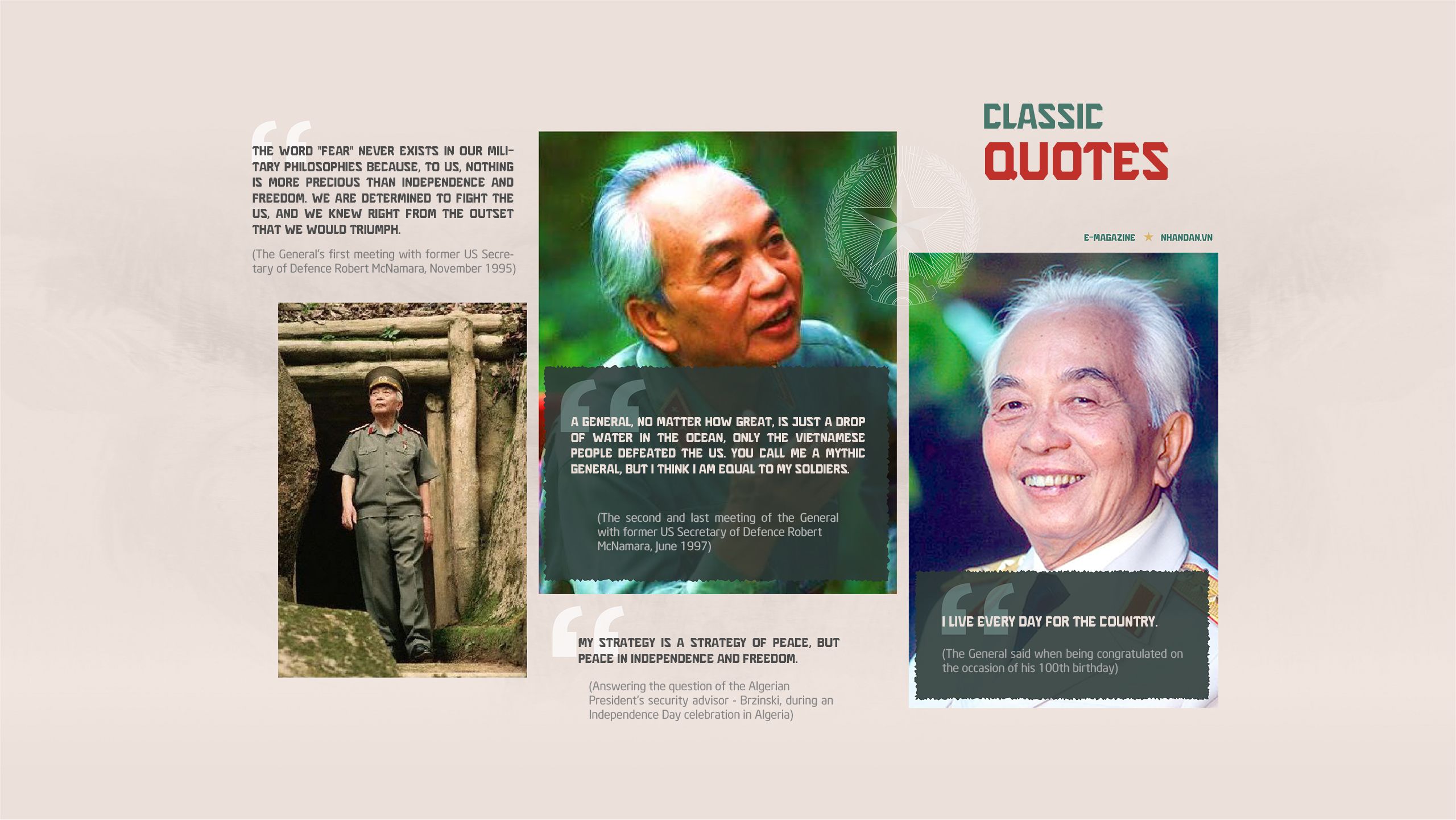
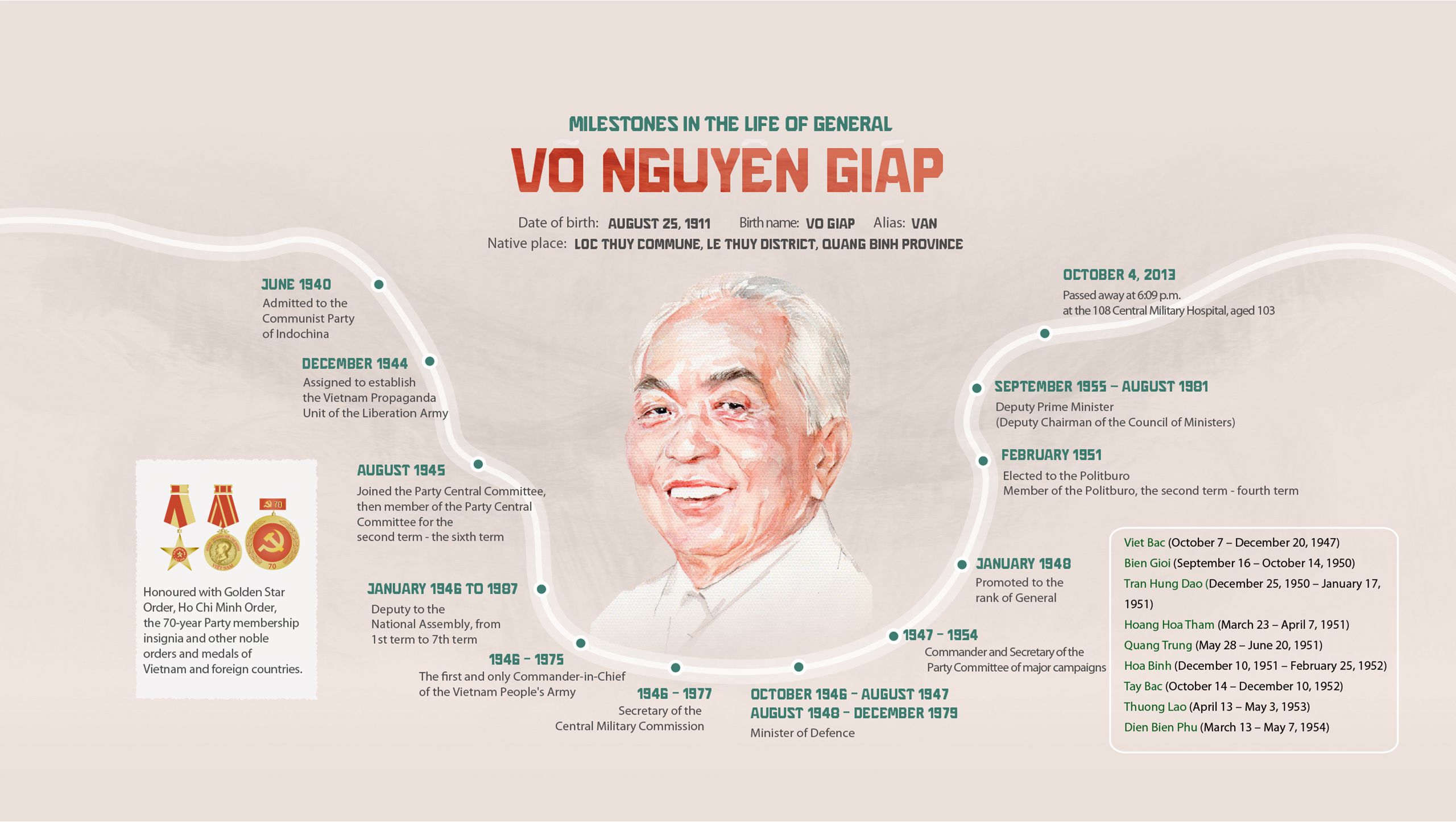
Published: December 2024
Content: Captain, Master Nguyen Ngoc Toan, Institute of Military History
Translation: NDO
Photo: People's Army Newspaper; VNA; Getty Images
Illustration: Artist Hoang Tuong
Design: Ta Lu




